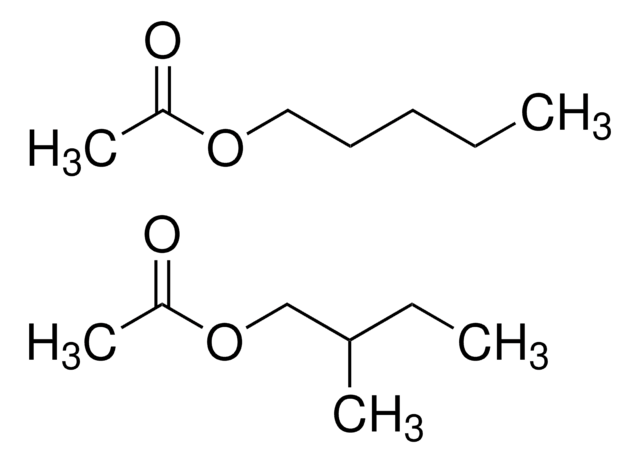W205508
Isoamyl acetate
≥95%, FCC, FG
Synonym(s):
Isopentyl acetate, Acetic acid 3-methylbutyl ester, Isoamyl acetate
About This Item
Recommended Products
biological source
synthetic
Quality Level
grade
FG
Fragrance grade
Halal
Kosher
Agency
follows IFRA guidelines
meets purity specifications of JECFA
reg. compliance
EU Regulation 1223/2009
EU Regulation 1334/2008 & 872/2012
FCC
FDA 21 CFR 117
FDA 21 CFR 172.515
vapor density
4.5 (vs air)
vapor pressure
5 mmHg ( 25 °C)
Assay
≥95%
form
liquid
autoignition temp.
680 °F
expl. lim.
7.5 %
refractive index
n20/D 1.4 (lit.)
bp
142 °C/756 mmHg (lit.)
mp
−78 °C (lit.)
density
0.876 g/mL at 25 °C (lit.)
application(s)
flavors and fragrances
Documentation
see Safety & Documentation for available documents
food allergen
no known allergens
fragrance allergen
no known allergens
Organoleptic
banana; fruity; sweet
SMILES string
CC(C)CCOC(C)=O
InChI
1S/C7H14O2/c1-6(2)4-5-9-7(3)8/h6H,4-5H2,1-3H3
InChI key
MLFHJEHSLIIPHL-UHFFFAOYSA-N
Looking for similar products? Visit Product Comparison Guide
General description
Application
- Gradually supply of isoamyl alcohol increases the isoamyl acetate production in solid-state fermentation.: This study explores the enhancement of isoamyl acetate production through the gradual supply of isoamyl alcohol during solid-state fermentation, highlighting its potential in biotechnological applications (Sainz-Mellado et al., 2023).
- Characterization of the flavor and nutritional value of coconut water vinegar based on metabolomics.: This research uses metabolomics to characterize the flavor and nutritional value of coconut water vinegar, identifying isoamyl acetate as a key flavor compound, emphasizing its significance in food chemistry (Xu et al., 2022).
- Green Synthesis of the Flavor Esters with a Marine Candida parapsilosis Esterase Expressed in Saccharomyces cerevisiae.: The study investigates the green synthesis of flavor esters, including isoamyl acetate, using a marine-derived esterase expressed in Saccharomyces cerevisiae, demonstrating an eco-friendly approach to ester production (Xue et al., 2020).
- Untargeted and targeted metabolomics strategy for the classification of strong aroma-type baijiu (liquor) according to geographical origin using comprehensive two-dimensional gas chromatography-time-of-flight mass spectrometry.: This paper employs advanced metabolomics techniques to classify baijiu based on geographical origin, identifying isoamyl acetate as a significant marker for flavor profiling (Song et al., 2020).
- The fungal aroma gene ATF1 promotes dispersal of yeast cells through insect vectors.: The research identifies the role of the ATF1 gene in the production of isoamyl acetate, which aids in the dispersal of yeast cells by attracting insect vectors, providing insights into microbial ecology and aroma compound production (Christiaens et al., 2014).
Signal Word
Warning
Hazard Statements
Precautionary Statements
Hazard Classifications
Flam. Liq. 3
Supplementary Hazards
Storage Class Code
3 - Flammable liquids
WGK
WGK 1
Flash Point(F)
91.4 °F - closed cup
Flash Point(C)
33 °C - closed cup
Personal Protective Equipment
Choose from one of the most recent versions:
Already Own This Product?
Find documentation for the products that you have recently purchased in the Document Library.
Customers Also Viewed
Our team of scientists has experience in all areas of research including Life Science, Material Science, Chemical Synthesis, Chromatography, Analytical and many others.
Contact Technical Service






